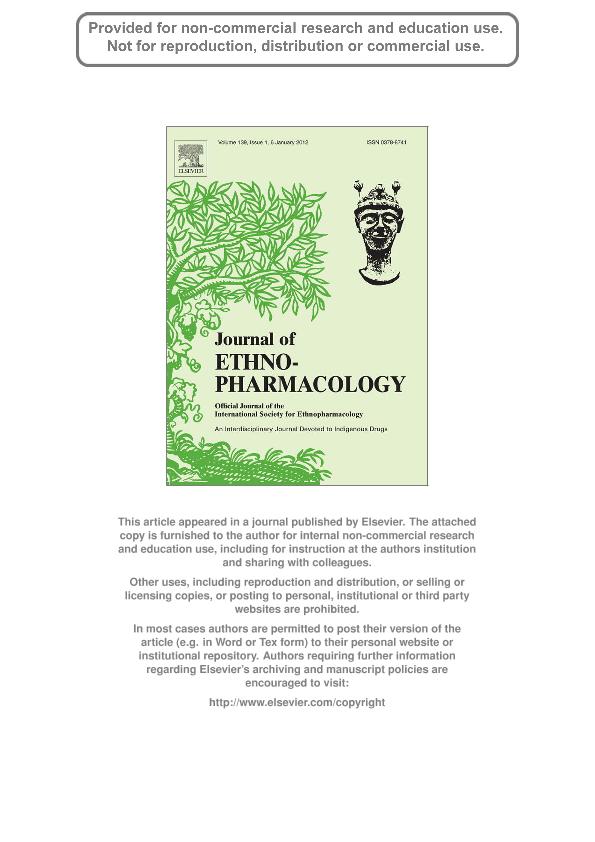Artículo
Investigation of the in vitro and ex vivo acetylcholinesterase and antioxidant activities of traditionally used Lycopodium species from south america on alkaloid extracts
Konrath, Eduardo Luis; Neves, Bruna Medeiros; Lunardi, Paula Santana; Passos, Carolina Dos Santos; Simões Pires, André; Ortega, María Gabriela ; Gonçalves, Carlos Alberto
; Gonçalves, Carlos Alberto ; Cabrera, Jose Luis
; Cabrera, Jose Luis ; Fonseca Moreira, José Cláudio; Henriques, Amélia T.
; Fonseca Moreira, José Cláudio; Henriques, Amélia T.
 ; Gonçalves, Carlos Alberto
; Gonçalves, Carlos Alberto ; Cabrera, Jose Luis
; Cabrera, Jose Luis ; Fonseca Moreira, José Cláudio; Henriques, Amélia T.
; Fonseca Moreira, José Cláudio; Henriques, Amélia T.
Fecha de publicación:
06/01/2012
Editorial:
Elsevier Ireland
Revista:
Journal Of Ethnopharmacology
ISSN:
0378-8741
e-ISSN:
1872-7573
Idioma:
Inglés
Tipo de recurso:
Artículo publicado
Clasificación temática:
Resumen
Ethnopharmacological relevance
The study was aimed at evaluating medicinal and therapeutic potentials of two Lycopodiaceae species, Lycopodium clavatum (L.) and Lycopodium thyoides (Humb. & Bonpl. ex Willd), both used in South American folk medicine for central nervous system conditions. Alkaloid extracts were evaluated for chemical characterization, acetylcholinesterase and antioxidant activities.
Materials and methods
The alkaloid extracts obtained by alkaline extraction were determined for each species by GC/MS examination. The evaluation of the anticholinesterase and the antioxidant activities of the extracts were tested by determining in vitro and ex vivo models. Effects on acetylcholinesterase (AChE) were tested in vitro using rat brain homogenates and ex vivo after a single administration (25, 10 and 1 mg/kg i.p.) of the alkaloid extracts in mice. The in vitro antioxidant effects were tested for the 2-deoxyribose degradation, nitric oxide (NO) interaction, 2,2-diphenyl-1-picryl hydrazyl (DPPH) radical scavenging activity and total reactive antioxidant potential (TRAP). After an acute administration (25 and 10 mg/kg i.p.) of the extracts in middle-aged (12 months) mice, the antioxidant effects were estimated through the thiobarbituric acid reactive substances test (TBARS), and the antioxidant enzymes activities for catalase (CAT) and superoxide dismutase (SOD) were measured.
Results
AChE activity was inhibited in vitro by the alkaloid-enriched extracts of both Lycopodium species in a dose and time-dependent manner in rat cortex, striatum and hippocampus. A significant inhibition was also observed in areas of the brain after acute administration of extracts, as well as decreased lipid peroxidation and increased CAT activity in the cortex, hippocampus and cerebellum. A moderate antioxidant activity was observed in vitro for the extracts. Chemically, the main alkaloids found for the two species were lycopodine and acetyldihidrolycopodine.
Conclusion
This study showed that the biological properties of the folk medicinal plants Lycopodium clavatum and Lycopodium thyoides include AChE inhibitory activity and antioxidant effects, two possible mechanisms of action in Alzheimer's related processes.
Archivos asociados
Licencia
Identificadores
Colecciones
Articulos(IMBIV)
Articulos de INST.MULTIDISCIPL.DE BIOLOGIA VEGETAL (P)
Articulos de INST.MULTIDISCIPL.DE BIOLOGIA VEGETAL (P)
Citación
Konrath, Eduardo Luis; Neves, Bruna Medeiros; Lunardi, Paula Santana; Passos, Carolina Dos Santos; Simões Pires, André; et al.; Investigation of the in vitro and ex vivo acetylcholinesterase and antioxidant activities of traditionally used Lycopodium species from south america on alkaloid extracts; Elsevier Ireland; Journal Of Ethnopharmacology; 139; 1; 6-1-2012; 58-67
Compartir
Altmétricas



